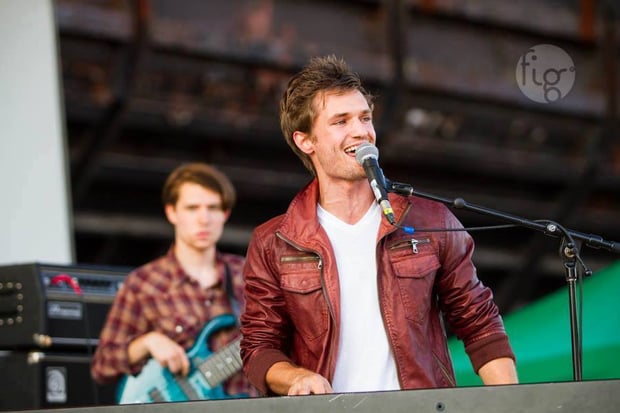 Image courtesy of the artist
Image courtesy of the artist
Music is one of those professions where you hear of untrained stars coming from small towns and then blowing the world away with their huge talent and passion. One of the biggest wow factors about Jimi Hendrix was that he couldn't even read music, yet he was considered the greatest guitarist of his generation. However, the vast majority of musicians we love have had at least some formal training, and it can make a big difference. We caught up with award-winning singer-songwriter, AJ Smith, who got his master's in songwriting from NYU Steinhardt. Not only has he had huge success landing gigs opening for the Eagles, performing at festivals like MusikFest, and releasing chart-topping singles, but it's been his education that led the way to his success. But beyond the success, as a songwriter, AJ really learned how to get the best song possible out of his creative mind – this was one of his most valuable lessons.
You earned your master's in songwriting from NYU Steinhardt, where you studied alongside Grammy-winning songwriters. Throughout your education, how has the process of songwriting evolved for you?
Over the course of my education and now career, my songwriting process constantly evolved. The biggest way to date, though, is in the tools I acquired during the songwriting master's program at NYU. I don't mean pens or a magic thesaurus that contains all the secrets of songwriting, but things like keeping a list of titles for potential songs, learning how to collaborate more effectively, and reading short stories more than novels in pursuit of inspiration. (I consider short stories to be the songs of the literary world...with less time than a novel to, as Glenn Frey would say, put big ideas into small places.)
It was such an incredible experience to learn how Leonard Cohen worked for years and wrote over 80 verses to "Hallelujah," and how Keith Richards and Mick Jagger co-wrote "Satisfaction" based on a vocal riff Richards recorded after waking up in the middle of the night with the melody in his head. And while these are all stories I may have been able to discover on my own, I learned so much more in the opportunities to discuss the processes of their creation and then analyze my own songs with top songwriters like Phil Galdston, Nile Rodgers, Glenn Frey, Roseanne Cash, Claude Kelly, and so many more.
[Yes, There ARE Rules for Songwriting]
Tell us about how you landed the opportunity to open for the Eagles. How did your songwriting career change after that experience?
Eagles frontman, Glenn Frey, had long been in talks with now-NYU songwriting program head Phil Galdston, and in part, their conversations led to the creation of the master's program. Due to that close relationship, when it came time for the Eagles to perform at a benefit that would raise money for NYU scholarships, I was fortunate enough to be one of three undergraduate students who had caught Glenn's ear. The three of us got together to work out arrangements to each of our original songs, and next thing I knew, we were up onstage at the Beacon Theatre opening for one of the most legendary bands of all time.
Afterwards, I was introduced to a few labels, and after working with Glenn in the studio for a few days on a couple of my songs, I made the decision to apply to NYU's newly formed master's program. Around the same time, I found myself overwhelmed to have been named a Songwriters Hall of Fame scholarship recipient and Carole Bayer Sager Songwriting Scholar. I finished my undergrad a semester early and I started in the master's program right away, unbelievably grateful for the support I had from Glenn and the NYU faculty.
If you hadn't formally studied songwriting, do you think you could have achieved accomplishments like that?
Absolutely not. Sure, I had thoughts of hitting the road and learning from experience rather than my teachers, and plenty of my friends have done just that and had successful careers. But I decided I could tour during summers and weekends while continuing my education. It was my professors who helped me truly recognize the potential of my pencil, and it was in collaboration with one of them (Alex Forbes) that I wrote my first charting song ("Summertime," which got up to #3 in Australia). And I can only hope that taking the time to stay in school and truly master my craft, guided by my mentors, will benefit me in the long run.
What have been some of your most memorable performance experiences you’ve landed through Sonicbids?
Sonicbids made it so much more manageable for me to find festivals and other performance opportunities. One of the most exciting opportunities came in the form of MusikFest, where I was selected to perform at the Steel Stacks in Bethlehem, PA's massive music festival. I was able to build an entire tour around that one gig, and since then have been able to book even more festivals like SummerFest in Milwaukee, and so many other great shows.
What made MusikFest particularly memorable was that it was the first time I was asked for an autograph after my set. I was so caught off guard and unprepared and relieved when my guitarist saved the day by borrowing Sharpies from one of the radio station tents that I realized I didn't have anything for them to sign right away, either. They asked me to sign their elbows, which I did, and then my guitarist ran to get CDs and shirts out of the trailer for the next group.
After such a successful start to your music career, how much of a long-term impact do you think will result from having a master's in songwriting?
I feel like the time I spent getting a master's degree will help lend my career a bit more stability in terms of longevity. While in the master's program, I also studied film scoring, music history, advanced music theory, and music business, in addition to my songwriters' forums and private lessons. It was through the program that I met Scott Jacoby (Grammy-winning mix engineer and producer) who has co-produced and mixed my upcoming single "Brooklyn Nights" (out January 15) and four other songs so far as part of my soon-to-be-released EP.
What are the top three most important lessons you've learned that you'd like to pass on to other songwriters?
First, writing is re-writing, and a song is never finished. One of my favorite things to do to challenge myself when writing is to take whatever I first think is the chorus, make it the verse, then try to write a better chorus. Afterwards, I make that chorus the pre-chorus and try to write another even better chorus. And in doing so, I may lose some of my original melodies or lyrics, but it's in service of helping the song reach its fullest potential. The funny thing is, all those discarded choruses can also be reworked into another song at another point in time. And it's a gift to have them to fall back on when the creativity well is running dry.
Second, spend as much time learning about the business aspect of the music industry as the artistic side. If you don't know what the consent decree is, find out. Understand the differences between collective and direct licensing, why the copyright law needs revision, and why the average songwriter needs a composition streamed over a million times in order to make $100 from that streaming service.
Third, always look to collaborate with people who are stronger songwriters in some way. Maybe they have a better knack for melody or lyric or simplifying overcomplicated thoughts. I am always looking to write with people who can push me to become a better songwriter. Support other songwriters by sharing their work and they might share yours, as well (cough, "Brooklyn Nights" coming out January 15).
Also, books that are well worth a read: Paul Zollo's Songwriters on Songwriting; Jeff Brabec's Music, Money, and Success; and any good anthology of short stories you can get your hands on. If you ever are looking for a good read, get in touch with me via Twitter @ajsmithmusic.


